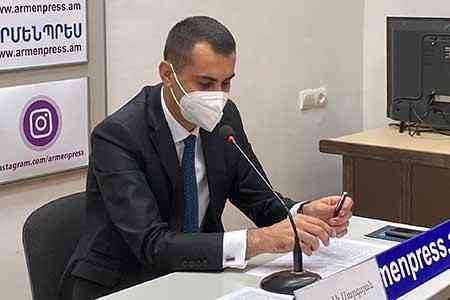


ArmInfo. After the final decommissioning of the second power unit of the operating nuclear power plant (NPP) in Metsamor, Armenia will not be able to provide domestic electricity consumption without commissioning additional generating capacities.
This was stated by Advisor to the Minister of Territorial Administration and Infrastructures of the Republic of Armenia Karen Sargsyan during a round table on the topic of "Nuclear energy as one of the mechanisms for ensuring energy security and independence of the Republic of Armenia", organized by the "Rosatom"State Corporation together with the Ministry of Territorial Administration and Infrastructures of the Republic of Armenia. He also noted that if Armenia plans to continue exporting electricity to Iran and Georgia, then the new unit should have a capacity of at least 1,000 MW. "The capacity of 1200 MW is enough for the energy system of Armenia, while the maximum amount of supplies to Iran can reach 1000 MW with a throughput capacity of 1200 MW", Sargsyan said.
Ilya Vergizaev, First Deputy General Director - Executive Director of JSC Rusatom Energy Projects (Rosatom) also took part in the discussions. Answering the question about the choice of the capacity of the new power unit, he stressed that Armenia should take into account both the decommissioning capacity of the existing Armenian NPP and the units of the Hrazdan TPP planned for decommissioning.
"Totally, it turns out that Armenia is bringing out 1 GW of almost basic generation with a high ICUF (installed capacity utilization factor). At the same time, since the country plans to develop industry and export electricity to neighboring countries, replacing the retired capacity alone will not be enough," he stressed.
According to Vergizaev, in order to attract investors to the industrial sector of Armenia, it will be necessary to show that the country has sufficient capacities. "Only a high-capacity unit can cope with this task," said a representative of Rosatom.
In addition, Ilya Vergizaev listed some of the socio-economic benefits that Armenia will receive during the construction and operation of a high-capacity plant. So, in addition to new jobs, according to preliminary calculations, the level of localization can reach 25-30%. Separately, he added that Armenia and Russia have a single regulatory framework for the construction and operation of the station, which will allow a smooth transition from the existing station to the new one.
In turn, Movses Vardanyan, ®HAEK¯ CJSC Genera1 Director - Director of the Armenian NPP noted that today the NPP generates more than a third of all electricity of the country. "At the same time, the station supplies electricity to the republican power grid at one of the lowest tariffs among all generators, which makes it possible to keep the consumer price of electricity in Armenia within acceptable limits," he noted.
The round table was also attended by leading Hungarian expert on nuclear energy Zsolt Harfash, Deputy Director General for Science for the Joint Institute for Power and Nuclear Research - SOSNY of the National Academy of Sciences of Belarus Tamara Korbut and General Director at "Armenian Scientific-Research Institute for Nuclear Power Plant Operation" (for short ''Armatom" SRI CJSC) Vahram Petrosyan. The event was moderated by UN energy expert Ara Marjanyan.
The speakers discussed the role of nuclear energy in the social, technological and economic development of the country and the region of presence, ensuring the energy security of the country, experience and prospects for the development of nuclear energy in Armenia.
It should be noted that for the first 4 months of 2022, the ANPP generation amounted to 1,245.4 million kWh, which exceeds the figure of a year ago by 16%.
A few days earlier, in an interview, the Minister of Territorial Administration and Infrastructures of Armenia Gnel Sanosyan said that before the end of this year, the Armenian government will decide on the capacities of the project for the construction of a new nuclear power unit. According to him, at this stage, the republic is in the difficult stage of making a decision regarding the new unit, Russian, American or other capabilities.